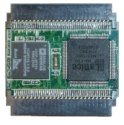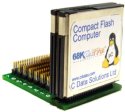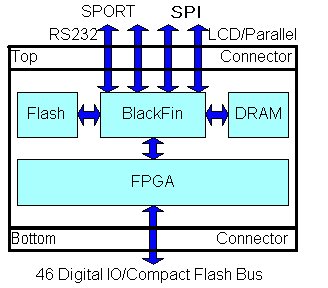DSP-powered CompactFlash computer runs uClinux
Dec 19, 2007 — by Eric Brown — from the LinuxDevices Archive — 11 views A British systems integrator has developed a second-generation computer based on the CompactFlash (CF) format. C Data Solutions's Compact Computer (CoCo) runs uClinux on a 500MHz Blackfin DSP (digital signal processor), and offers programmable I/O via an integrated FPGA (field-programmable gate array).
A British systems integrator has developed a second-generation computer based on the CompactFlash (CF) format. C Data Solutions's Compact Computer (CoCo) runs uClinux on a 500MHz Blackfin DSP (digital signal processor), and offers programmable I/O via an integrated FPGA (field-programmable gate array).
(Click for larger view of the Compact Computer)
 C Data's older Compact Flash Computer (Click for details) |
Like C Data's original Compact Flash Computer (pictured at right), which was introduced in 2004, the CoCo is designed as a CF card that can plug into any host's CF slot or control an attached CF bus that developers can populate with other CF-based peripherals. In this way developers can quickly create miniscule Linux systems, says C Data. The Compact Flash Computer is being used for rapid prototyping and conceptual proofs by aerospace, defense, and consumer electronics companies, according to the company.

Compact Computer block diagram — The Blackfin peripherals are linked to the top connector, whereas the FPGA is connected to the bottom connector.
Whereas the Compact Flash Computer is based on a Freescale MPC5272 system-on-chip (SoC) clocked at 66MHz, the new Compact Computer uses a 500MHz Blackfin BF533 DSP. It also adds an FPGA, which is preconfigured as either an 8/16 bit CompactFlash host or as an RS232 device, presenting itself as a COM port to a host computer. The FPGA can be reprogrammed to provide different bus types, mimicking any device, says C Data, and it can be deployed as part of a multi-processor system.
The Compact Computer can play a number of different roles: plugged in as a CF-based peripheral; as a host that controls other CF cards, or as a single-board computer (SBC) glued onto a multiprocessor system:
- Peripheral — As a CF-based peripheral, the Compact Computer can provide additional processor power, functionality and security to legacy desktop or handheld hardware, says C Data. The compact device can exploit the SPI, RS232, LCD/Video/Digital IO or SPORT signals that link to the top connector. The host can communicate with the device via a terminal emulator or simple communications application. Because the FPGA can be reprogrammed to present any interface to the host, no legacy software changes are required, says the company. For example, the FPGA could be reprogrammed as a storage card, with data accessed via the RS232 or SPI, and then transmitted via a GSM modem.
- Host — In host mode, miniature computer systems can be constructed out of third-party CF cards, says C Data, including Ethernet, wireless, storage, GPS, or GSM/GPRS. The FPGA controls the adapter card(s) by providing all address/data and control signals.
- SBC — The device can be integrated on a carrier board or motherboard as a SBC, says the company. Developers can reprogram the FPGA to provide additional system peripherals or glue logic. Multi-processor systems can be developed, using shared memory or message passing, and the FPGA can be used to accelerate algorithms for cryptology or MPEG.
 ADI stamp DSP reference board for the Blackfin BF533 (Click to enlarge) |
Analog Devices Inc.'s (ADI) Blackfin DSP is not a typical DSP, as it integrates a DSP core with “RISC-like” 32-bit instructions similar to those found in traditional microcontrollers. It was officially added to the Linux arsenal with this summer's Linux 2.6.22 release, which supported six models, including the BF533. The BF533 is equipped with two 16-bit MACs, two 40-bit ALUs, four 8-bit video ALUs, and a 40-bit shifter, says C Data. It is said to offer a RISC-like register and instruction model, and supports up to 148KB of on-chip memory.
The Compact Computer is said to provide the following features:
- Processor — Analog Devices Blackfin BF533 500MHz base product (up to 600MHz)
- Memory — 32MB SRAM (expandable to 64MB)
- Flash — 8MB (expandable to 16MB)
- Bus interface — FPGA
- I/O — 46 DIO, RS232, SPI, LCD, SPORT
- Dimensions — 1.65 x 1.45 x .2 inches (42 x 37 x 5 mm)
- OS — u-boot/uClinux (includes GNU/Insight)
Availability
The Compact Computer appears to be available now and sells for 100 UK Pounds ($202 US) in small quantities, says C Data. The company also offers design and engineering services for its products.
This article was originally published on LinuxDevices.com and has been donated to the open source community by QuinStreet Inc. Please visit LinuxToday.com for up-to-date news and articles about Linux and open source.